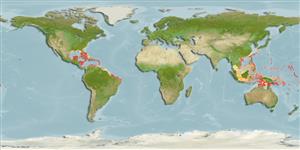Common names from other countries
Environment: milieu / climate zone / depth range / distribution range
Ecologia
marinhas associadas(os) a recifes; intervalo de profundidade 2 - 46 m (Ref. 7510). Tropical; 36°N - 24°S, 99°W - 5°W
Western Atlantic: southern Florida and Texas (USA), Bahamas and throughout the Caribbean Sea to Rio de Janeiro, Brazil (Ref. 57756). Eastern Atlantic: St. Helena (?, Randall pers. comm.).
Tamanho / Peso / Idade
Maturity: Lm ? range ? - ? cm
Max length : 9.5 cm SL macho/indeterminado; (Ref. 5288)
Descrição breve
Chaves de identificação | Morfologia | Morfometria
Espinhos dorsais (total) : 10; Raios dorsais moles (total) : 11; Espinhos anais: 3; Raios anais moles: 6. White interspaces between first four dark bars bisected by narrow yellowish brown bars.
Moderately common in rocky areas and among rubble, often in crevices and shallow caves. Usually lies at rest on the substrate (Ref. 9626). Feeds primarily on small crustaceans, particularly copepods, shrimps and shrimp larvae, crabs and crab larvae as well as polychaetes (Ref. 7510).
Life cycle and mating behavior
Maturities | Reprodução | Spawnings | Egg(s) | Fecundities | Larvas
Pelagic spawner. Further histological evidence is needed to establish protogyny (Ref. 103751).
Robins, C.R. and G.C. Ray, 1986. A field guide to Atlantic coast fishes of North America. Houghton Mifflin Company, Boston, U.S.A. 354 p. (Ref. 7251)
Categoria na Lista Vermelha da IUCN (Ref. 130435)
CITES (Ref. 128078)
Not Evaluated
Ameaça para o homem
Harmless
Utilização humana
Pescarias: espécies comerciais; Aquário: Espécies comerciais
Ferramentas
Relatórios especiais
Descarregue XML
Fontes da internet
Estimates based on models
Preferred temperature (Ref.
115969): 25 - 28.4, mean 27.5 (based on 344 cells).
Phylogenetic diversity index (Ref.
82804): PD
50 = 0.5312 [Uniqueness, from 0.5 = low to 2.0 = high].
Bayesian length-weight: a=0.00933 (0.00367 - 0.02375), b=3.07 (2.85 - 3.29), in cm Total Length, based on LWR estimates for this (Sub)family-body shape (Ref.
93245).
Nível Trófico (Ref.
69278): 3.2 ±0.2 se; based on diet studies.
Fishing Vulnerability (Ref.
59153): Low vulnerability (10 of 100).
